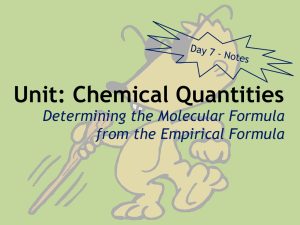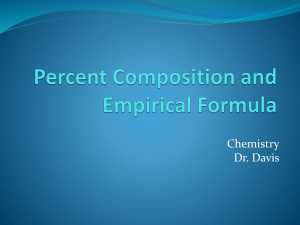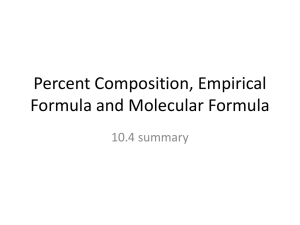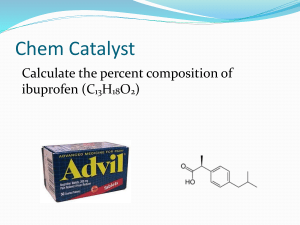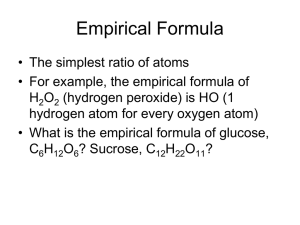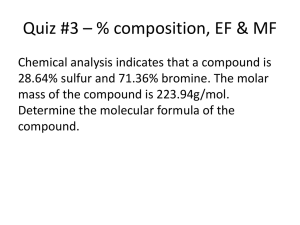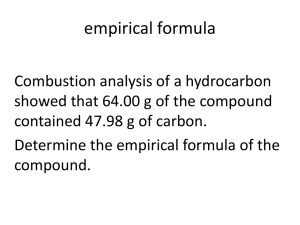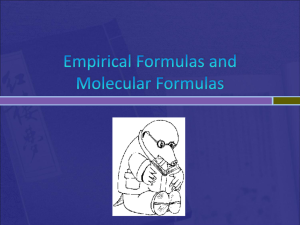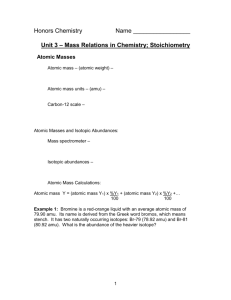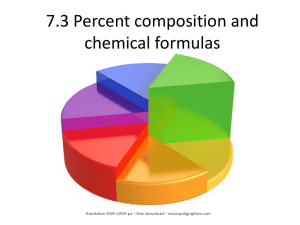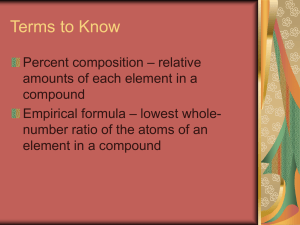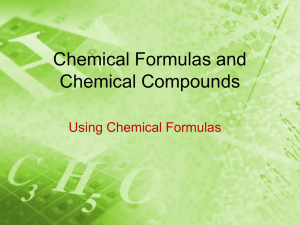Empirical Formula
advertisement
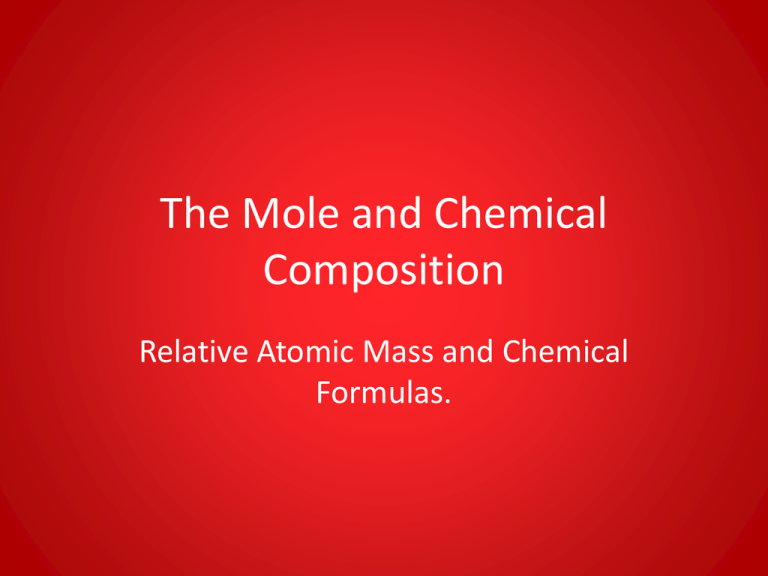
The Mole and Chemical Composition Relative Atomic Mass and Chemical Formulas. Average Atomic Mass • Why are the atomic masses of most elements on the periodic table not exact whole numbers? • These are relative atomic masses • Most have isotopes and are a mixture of these differently massed species. Most Elements are Mixtures of Isotopes • The periodic table reports Average Atomic Mass, a weighted average of the atomic mass of an element’s isotopes. • Example: If I said there was a larger abundance of C-12 than C-13, which value would the average atomic mass be closer to? Calculating Average Atomic Mass • If you know the abundance of each isotope, you can calculate the average atomic mass of an element. • The mass of a Cu-63 atom is 62.94 amu, and that of a Cu-65 atom is 64.93 amu. Abundance of Cu-63 is 69.17% and Cu-65 is 30.83%. Find the average atomic mass of Cu. More Practice • Calculate the average atomic mass for gallium if 60.00% of its atoms have a mass of 68.926 amu and 40.00% have a mass of 70.925 amu. • Calculate the average atomic mass of oxygen. Its composition is 99.76% of atoms with a mass of 15.99 amu, 0.038% with a mass of 17.00 amu, and 0.20% with a mass of 18.00 amu. Molar Masses • Review: • Calculate the molar mass for each of the following compounds: CsI C12H22O11 HC2H3O2 CaHPO4 I2 Mg3(PO4)2 Percent Composition • A Percent Composition is the percentage by mass of each element in a compound. • Just like your grade on a test • First, calculate the molar mass of the ENTIRE compound (total points possible). • Then, divide that by the mass of the part you are trying to find the percent for (your score). Practice with Percent Composition • Calculate the percent composition of iron in iron(III)oxide. • Calculate the percent of Nitrate in magnesium nitrate. Empirical Formulas • The Empirical Formula is a chemical formula that shows the composition of a compound in terms of the relative numbers and kinds of atoms in the SIMPLEST RATIO. • How do we find this simplest ratio? Empirical Formulas • To calculate the empirical formula, you must first know the percent composition. • Using the percents, assume a 100g sample. – How will this help? – What units will this leave your percents in? Empirical Formulas • Now that we are in grams of each component (from the percent compositions), we need to convert these to moles. • Last step, divide each number by the LOWEST number to determine what the lowest ratio values will be. Lets Practice!! • Chemical analysis of a liquid shows that it is 60.0% C, 13.4% H, and 26.6% O by mass. Calculate the empirical formula of this substance. More Practice!! • A dead alkaline battery is found to contain a compound of Mn and O. Its analysis gives 69.6% Mn and 30.4% O. • A compound is 38.77% Cl and 61.23% O. • A liquid compound is 18.0% C, 2.26% H, and 79.7% Cl. Molecular Formulas • Molecular Formulas are multiples of Empirical Formulas. • A molecular formula is a chemical formula that shows the number and kinds of atoms in a molecule, but not the arrangement of the atoms. Molecular Formulas • The molar mass of a compound is equal to the molar mass of the empirical formula times a whole number, n. • Fill in the following table: Empirical Formula Molar mass of compound Molar mass of the empirical formula MM/EFM Molecular Formula Practice with Molecular Formulas • The empirical formula for a compound is P2O5. Its experimental molar mass is 284 g/mol. Determine the molecular formula of the compound. Practice with Molecular Formulas • The empirical formula for a compound is P2O5. Its experimental molar mass is 284 g/mol. Determine the molecular formula of the compound. Empirical Formula Molar mass of compound Molar mass of the empirical formula MM/EFM Molecular Formula More Practice • A compound has an experimental molar mass of 78 g/mol. Its empirical formula is CH. What is its molecular formula? • A brown gas has the empirical formula NO2. Its experimental molar mass is 46 g/mol. What is its molecular formula? Lets work on Page 253-254, 54-72 even. Odds would be excellent practice also.
